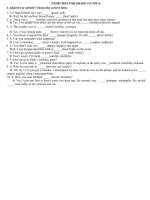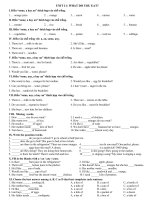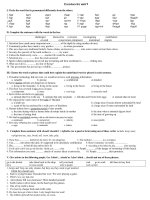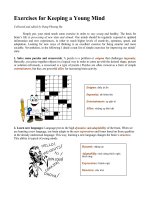Tài liệu Exercises for Keeping a Young Mind docx
Bạn đang xem bản rút gọn của tài liệu. Xem và tải ngay bản đầy đủ của tài liệu tại đây (203.74 KB, 3 trang )
Exercises for Keeping a Young Mind
Collected and edited by Dang Phuong Ha
Simply put, your mind needs some exercise in order to stay young and healthy. The basis for
brain’s life is processing of new data and stimuli. Our minds should be regularly exposed to updated
information and new experiences, in order to reach higher levels of creativity, openness, speed, and
adaptation. Looking for new ways of thinking is an excellent exercise for being smarter and more
sociable. Nevertheless, in the following I detail a neat list of simple exercises for improving our minds’
state:
1. Solve some puzzles and crosswords: A puzzle is a problem or enigma that challenges ingenuity.
Basically, you piece together objects in a logical way in order to come up with the desired shape, picture
or solution (obviously, a crossword is a type of puzzle.) Puzzles are often viewed as a form of simple
entertainment, but they are powerful allies for increasing brain activity.
2. Learn new languages: Language proves the high dynamics and adaptability of the brain. When we
are learning a new language, our brain adapts to the new expressions and forms based on those qualities
in the already understood language. This way, learning a new language changes the brain’s structure.
This ability is typical of young minds.
Enigma: đi u bí nề ẩ
Ingenuity: tài khéo léo
Entertainment: s gi i tríự ả
Allies: nh ng s liên k tữ ự ế
Dynamic: đ ng l cộ ự
Adaptability: kh n ng thích nghi, ả ă
thích ngứ
Expressions: thành ngữ
Structure: c u trúcấ
3. Play some musical instrument: The effect is similar to learning a new language, albeit in another
dimension. The musical mind is also fairly complex, and acquiring a basic level of coordination and
musical receptive ability depends on the brain regrouping the perceived and repeated musical structures.
That’s what we are after: an active brain.
4. Play a videogame you like: Long gone are the times when videogames were only for kids. Currently,
we have games for all ages. Go and choose a game you like, and start playing. If the game is good, you
will barge into environments involving series of decisions. Such artificial environments provide plenty
of stimuli, and our brains will be reacting to them.
5. Do some calculus and mathematical operations: Besides keeping our math fresh, mathematical
operations activate the left side of the brain.
Albeit: m c dùặ
Dimension: chi u, chi u h ngề ề ướ
Receptive: d ti p thu, d l nh h iễ ế ễ ĩ ộ
Perceive: hi u đ c, l nh h i đ c, ể ượ ĩ ộ ượ
n m đ cắ ượ
Long gone: ã qua lâu r iĐ ồ
Barge into: va ph iả
Series of decisions: 1 lo t nh ng quy t đ nhạ ữ ế ị
Artificial: nhân t oạ
Stimuli (số nhiều của stimulus): s kích ự
thích, tác nhân kích thích
Calculus: Tính toán, bài toán
Mathematical operation: Bài toán
6. Try to write with your opposite hand: Switching hands stimulates other parts of our brains, which
therefore improves logical reasoning and creativity. Think outside the box. Besides writing, try other
things such as brushing your teeth with your wrong hand.
7. Read, provide summaries of the texts, and try to retain the key concepts: This exercises
concentration, abstraction, retention, and general relation of ideas. By doing summaries, your mind forms
a network of concepts.
8. Take a shower with your eyes closed: Train your brain to work with incomplete information.
9. Talk to your friends: A circle of good friends is a very important requirement for keeping a healthy
mind. Bad friends are no friends at all, and mean a waste of your time and positive energy.
Finally, we should keep in our minds that young brains never stop changing and adjusting. Sound
sleep and healthy eating is very important too. And you always have the right to change your mind (thay
đổi quyết định).
Opposite hand: tay không thu nậ
Switch: chuy n sangể
Summaries of the texts: tóm t t các v n b n.ắ ă ả
Retain: gi l iữ ạ
Concept: khái ni m, ý ni m chungệ ệ









